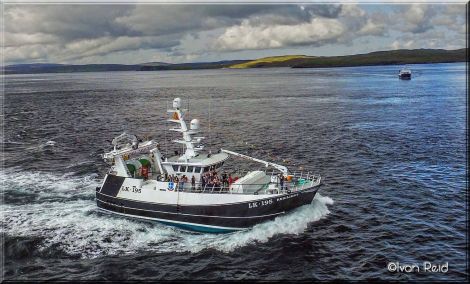News / Report makes heady claims for future of fishing
THE FISHING industry is poised for substantial growth when the UK exits the European Union, according to the latest analysis by the North Atlantic Fisheries College’s Ian Napier.
According to Napier the industry could double in size if Britain follows the example of Iceland, where 95 per cent of the fish caught within the island’s 200-mile limit is landed by local vessels.
But Scottish Fishermen’s Federation chief executive Bertie Armstrong warned that the growth will only be achieved with “political backbone” and the avoidance of “messy trade-offs”.
The study highlights the fact that in 2016 UK vessels caught just over one-third (36%) of all the fish and shellfish landed from British waters, worth £815m.
In addition, UK vessels caught £112m worth of fish and shellfish from other areas of the EU Exclusive Economic Zone.
Under the best case post-brexit scenario, by Napier’s calculus, with Britain as an independent coastal state operating outside the EU’s Common Fisheries Policy and therefore able to control access and quota allocation, the industry could be worth up to £1.68bn.
Even if UK boats are barred from catching within the EU EEZ, the industry would stand to grow in value by 92 per cent to £1.57bn.
Armstrong said: “These figures highlight very starkly the sea of opportunity brexit will yield for the industry.
“Key to maximising the potential gain will be political backbone in the brexit talks, and 100 per cent resistance to any kind of messy trade-offs such as guaranteeing no-change access to EU vessels, or linkage of the trading of fish to access to UK waters.”
He added: “We have never said that EU vessels will not be permitted to fish in UK waters after Brexit, but the critical element here is that this will be negotiated in the correct international forums and be done so on our terms and no-one else’s.”
Become a member of Shetland News
Shetland Fish Producer’s Organisation chief executive Brian Isbister said that whatever the outcome of Brexit, fishermen should be in a position to benefit from a greater share of the catch.
Isbister added: “Roughly speaking, we are utilising a third of our potential because of the arrangements of the past. However you look at it it will be an opportunity for the future to expand on that.
“Each one of the outcomes points to the opportunities for the industry being improved. How quickly that can be achieved is down to the will of the governments.”
According to the study, if UK vessels were to catch 50 per cent of the fish from their own waters the industry would grow in size from between 9 per cent (£891m) to 23 per cent (£1bn), depending on whether access to EU waters is permitted or denied.
At 75 per cent, the industry would be worth between £1.19bn (47 per cent growth) and £1.31bn (60 per cent) and at 84 per cent, equivalent to how Norway operates, it would be between £1.32bn (61per cent) and £1.43bn (75 per cent).
Under the Iceland scenario of 95 per cent, the industry would be worth between £1.48bn and £1.6bn (growth of 82 per cent or 96 per cent respectively).
Meanwhile a consultant’s study for the Scottish Government projects a number of outcomes post-brexit, the worst of which is for a downturn in the industry owing to the introduction of tariffs. The best projection for an increase of 5,000 jobs in fishing and associated sectors and an increase of £540 million for the industry.
Under some scenarios demersal and pelagic fishing would get a boost from a re-allocation of quotas that would heavily outweigh the negative impact of tariffs, but non-sector and non-quota fisheries like crabs would suffer under that arrangement.
Become a member of Shetland News
Shetland News is asking its many readers to consider paying for membership to get additional features and services: -
- Remove non-local ads;
- Bookmark posts to read later;
- Exclusive curated weekly newsletter;
- Hide membership messages;
- Comments open for discussion.
If you appreciate what we do and feel strongly about impartial local journalism, then please become a member of Shetland News by either making a single payment, or setting up a monthly, quarterly or yearly subscription.























































